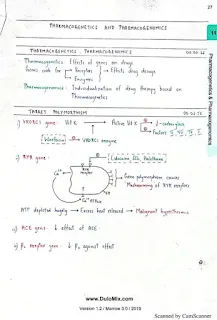Pharmacogenetics and Pharmacogenomics: Download PDF, Notes, and PPT
Explore the cutting-edge fields of Pharmacogenetics and Pharmacogenomics with our comprehensive PDF resource. This material delves into how an individual's genetic makeup influences their response to drugs, paving the way for personalized medicine. Download this PDF for in-depth notes, or find related PowerPoint presentations (PPTs) to understand the genetic basis of drug efficacy and adverse reactions. Ideal for students, researchers, and clinicians interested in optimizing drug therapy through genetic insights.
Our downloadable content covers key concepts, clinical applications, and the future directions of pharmacogenetics and pharmacogenomics. Learn about genetic polymorphisms affecting drug metabolism, transport, and targets. Download now to access valuable information and enhance your knowledge in this rapidly evolving area of pharmacology.
Keywords: Download PDF, Pharmacogenetics Notes, Pharmacogenomics PPT, Personalized Medicine PDF, Genetic Drug Response, Pharmacology Study Material, Free Genetics PDF, DNA and Drug Therapy, Individualized Treatment.
The Dawn of Personalized Medicine: Understanding Pharmacogenetics and Pharmacogenomics
Pharmacogenetics and pharmacogenomics are two closely related fields at the forefront of medical science, promising a future where medical treatments are tailored to an individual's unique genetic profile. While often used interchangeably, there are subtle distinctions: Pharmacogenetics typically refers to the study of how variations in a single gene influence the response to a single drug. In contrast, Pharmacogenomics is a broader term encompassing the study of how all the genes in the genome (the entire genetic makeup) can influence responses to drugs. Essentially, pharmacogenomics applies genomic technologies to discover new drugs and to further characterize older ones. This PDF provides an essential overview of these transformative disciplines.
Why Study Genetic Influences on Drug Response?
The "one-size-fits-all" approach to medicine has long been recognized as suboptimal. Patients exhibit considerable variability in their response to medications; some may experience excellent therapeutic outcomes, others may have little to no benefit, and a subset may suffer from severe adverse drug reactions (ADRs). A significant portion of this variability can be attributed to genetic differences among individuals. These genetic variations can affect:
- Pharmacokinetics: How the body absorbs, distributes, metabolizes, and excretes a drug (ADME processes). Genetic variations in drug-metabolizing enzymes (e.g., Cytochrome P450 family), drug transporters (e.g., P-glycoprotein), are prime examples.
- Pharmacodynamics: How a drug acts on the body, including its interaction with receptors, ion channels, enzymes, and immune system components. Variations in genes encoding these targets can alter drug sensitivity.
By understanding these genetic influences, pharmacogenetics and pharmacogenomics aim to:
- Maximize drug efficacy.
- Minimize adverse drug reactions.
- Optimize drug dosage.
- Guide the selection of the most appropriate drug for an individual.
- Aid in the development of new, targeted therapies.
Key Concepts in Pharmacogenetics and Pharmacogenomics
Several core concepts underpin these fields:
- Genetic Polymorphisms: These are variations in DNA sequence that are common in a population (typically defined as occurring in at least 1% of individuals). Single Nucleotide Polymorphisms (SNPs), insertions/deletions (indels), and copy number variations (CNVs) are common types of polymorphisms that can impact drug response.
- Phenotypes of Drug Metabolism: Based on their genetic makeup for metabolizing enzymes, individuals can be classified into different phenotypes, such as:
- Poor Metabolizers (PMs): Lack or have significantly reduced enzyme activity. They may experience drug accumulation and increased risk of toxicity with standard doses of drugs that are substrates for that enzyme.
- Intermediate Metabolizers (IMs): Have reduced enzyme activity.
- Extensive (Normal) Metabolizers (EMs): Have normal enzyme activity.
- Ultrarapid Metabolizers (UMs): Have increased enzyme activity, often due to gene duplication. They may metabolize drugs too quickly, leading to therapeutic failure at standard doses.
- Genotype-Phenotype Correlation: Establishing a clear link between a specific genetic variation (genotype) and the observable drug response (phenotype) is crucial for clinical application.
- Biomarkers: Genetic variations can serve as biomarkers to predict drug response or susceptibility to ADRs.
Clinical Applications and Examples
Pharmacogenetics is already impacting clinical practice in various therapeutic areas:
- Warfarin: Dosing of this anticoagulant is influenced by polymorphisms in CYP2C9 (metabolism) and VKORC1 (drug target) genes. Genetic testing can help personalize warfarin dosage to reduce bleeding risks or sub-therapeutic effects.
- Clopidogrel: This antiplatelet drug is a prodrug activated by CYP2C19. Poor metabolizers for CYP2C19 may have reduced antiplatelet effect, increasing the risk of cardiovascular events.
- Abacavir: A strong association exists between the HLA-B*5701 allele and hypersensitivity reactions to this antiretroviral drug. Screening for this allele is now standard practice before initiating abacavir.
- Codeine: This analgesic is metabolized to morphine by CYP2D6. Ultrarapid metabolizers can experience morphine toxicity even at standard doses, while poor metabolizers may get little pain relief.
- Cancer Chemotherapy: Examples include thiopurine methyltransferase (TPMT) testing before azathioprine or 6-mercaptopurine administration to prevent severe myelosuppression, and DPYD testing for fluoropyrimidines like 5-fluorouracil.
The Future: Personalized Medicine
Pharmacogenomics holds the key to realizing the vision of personalized medicine, where treatment decisions are tailored to the individual patient. As genomic sequencing costs decrease and our understanding of gene-drug interactions grows, we can expect:
- More widespread use of genetic testing to guide drug selection and dosing.
- Development of drugs targeted at specific genetic profiles.
- Reduction in trial-and-error prescribing.
- Improved patient safety and treatment outcomes.
Challenges remain, including the need for more extensive research, development of cost-effective and rapid testing platforms, education of healthcare professionals, and addressing ethical, legal, and social implications (ELSI). However, the potential benefits of pharmacogenetics and pharmacogenomics in revolutionizing healthcare are immense. This PDF serves as an introductory guide to these exciting and rapidly advancing fields.
Info!
If you are the copyright owner of this document and want to report it, please visit the copyright infringement notice page to submit a report.

